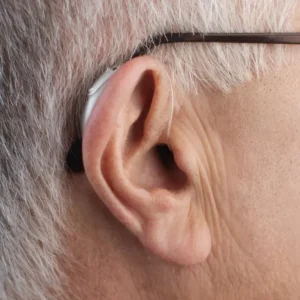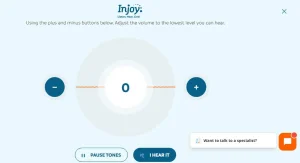
Best Hearing Aids for Small Ear Canals: Finding Your Perfect Fit
TL;DR: Small ear canals require specific hearing aid designs to ensure comfort and performance. The best options include completely-in-canal (CIC) models like the Signia Silk
Home » Online Hearing Loss Test vs. In-Person Audiological Evaluation: Pros and Cons

This article delves into the nuances of hearing loss tests, contrasting online hearing evaluations with traditional in-person assessments. We aim to guide you through the various aspects of hearing loss treatment, highlighting the benefits and drawbacks of each method. Whether you’re considering an online test or a visit to a specialist, this article provides essential insights to help you make an informed decision.
Table of Contents
ToggleHearing loss refers to the reduced ability to perceive sounds. It can occur in one or both ears and varies in severity from mild to profound. This condition affects individuals differently, stemming from a range of causes:
Hearing loss can profoundly impact social interaction, leading to difficulties in communication and participation in social activities, and can contribute to isolation, depression, and anxiety. While there’s no cure for sensorineural hearing loss, the most common type, various treatments, and devices offer substantial help. These include hearing aids and specialized assistive devices.
The prevalence of hearing loss is significant, affecting about 15% of U.S. adults. It’s more common in men aged 20 to 69 and also affects about 15% of teens aged 12 to 19. Additionally, two to three out of every 1,000 U.S. children are born with detectable hearing loss.
It’s important to note that hearing loss is a spectrum, affecting people of all ages and varying in severity. The greatest threat to most people’s hearing is noise, but other causes range from genetics to medication side effects. Recognizing the signs of hearing loss and seeking professional help is crucial for effective management and maintaining a fulfilling lifestyle.
Learn more about sensorineural hearing loss.

Hearing loss tests are crucial in early diagnosis and effective management of hearing loss. They offer several key benefits:
If you have concerns about your hearing, discussing a hearing test with a healthcare professional is vital. Early detection and treatment can significantly enhance your quality of life.
Explore more about hearing loss treatment and the benefits of hearing aids.
An online hearing evaluation offers a convenient initial assessment of your hearing capabilities. This digital approach typically involves a user listening to various tones or words across different volumes and frequencies. Participants respond to these sounds by clicking a button or typing a response. The test generates a report showing hearing thresholds at various frequencies, providing valuable insights into one’s hearing health.
While online hearing evaluations are not as comprehensive as in-person assessments, they offer several benefits:
However, it’s important to remember that online evaluations are a practical starting point for anyone concerned about hearing health. If an online test indicates potential hearing issues, connecting with a hearing care professional is essential. Quality online hearing evaluations include consultations with hearing care specialists like Injoy Hearing’s online hearing test does.
Traditional hearing loss tests involve a detailed assessment of your hearing abilities. While online tests provide a convenient starting point, conventional hearing tests are essential for specific individuals, including:
In-office hearing loss tests include tone testing like online hearing evaluations. They may also have:
While online tests are usually free, traditional exams might incur costs. However, health insurance, Medicare, or Medicaid often cover these tests.
These tests, encompassing everything from bone conduction testing to speech audiometry, are vital for individuals with specific symptoms or medical histories. Although they might come with associated costs, many are covered by insurance plans, making them accessible to a broader population. The detailed insights gained about an individual’s hearing health form the foundation for developing effective, personalized treatment plans.

The transition from identifying hearing loss through testing to selecting and implementing a treatment plan is critical in managing hearing health. Here’s an overview of this process:
This comprehensive approach, from initial testing to personalized treatment, ensures that each individual receives the hearing loss treatment and support necessary to enhance their hearing and overall quality of life.
You should only purchase hearing aids from licensed professionals since they are medical devices. This ensures quality, safety, and effectiveness tailored to your individual needs. A hearing professional not only tests and diagnoses your hearing loss but also provides crucial follow-up services.
At Injoy, we understand that dealing with hearing loss can be difficult. We aim to make selecting hearing aids as easy and enjoyable as possible. Our experienced team is dedicated to finding customized solutions that fit your needs, ensuring you return to living life fully. We believe in complete satisfaction and leverage our expertise in telecare/remote care models to provide the best service. With Injoy, you receive a product and a partnership in managing your hearing health.

This article has illuminated the distinct paths of online and in-person hearing evaluations, each with its own set of advantages. While online tests offer convenience and early detection, in-person assessments provide a depth of analysis critical for those with specific symptoms or medical histories.
Remember, early detection through either online or traditional testing is key to effective management and treatment of hearing loss. With advancements in hearing aid technology and personalized care, overcoming the challenges of hearing loss is more feasible than ever. Injoy Hearing stands committed to guiding you through this journey, offering expert advice, custom-fit solutions, and ongoing support.
If you’re taking your first steps in addressing hearing concerns or seeking to understand more about your hearing health, we invite you to take Injoy Hearing’s online hearing test. This simple, initial evaluation can be your gateway to a world of clearer hearing and improved quality of life. Begin your journey with Injoy Hearing today, and embrace the sound of life to its fullest.

TL;DR: Small ear canals require specific hearing aid designs to ensure comfort and performance. The best options include completely-in-canal (CIC) models like the Signia Silk

Your audiologist just recommended rechargeable hearing aids. Great choice. But naturally, you want to know: how long before you’re shopping again? The answer splits into

You asked your spouse to repeat themselves. Again. The TV volume crept up another notch. Friends make jokes about your signs of hearing loss. These

You dropped serious money on Phonak hearing aids. Now you’re wondering how long they’ll actually work before you’re back at square one. Fair question. Hearing
To start your journey towards better hearing with confidence, Injoy is proud to offer a 45-day risk-free hearing aid trial. This allows you to experience the difference our hearing aids can make, ensuring they meet your expectations and fit your lifestyle perfectly.
Improve your hearing and improve your life today by contacting Injoy to learn more! Call (844) 914-3331

Need hearing aids? Explore our range of hearing aids and discover the best option for your lifestyle and Unique Hearing Needs.
Are you a current patient with us? We're here to help with any adjustments, repairs, or support you may need.